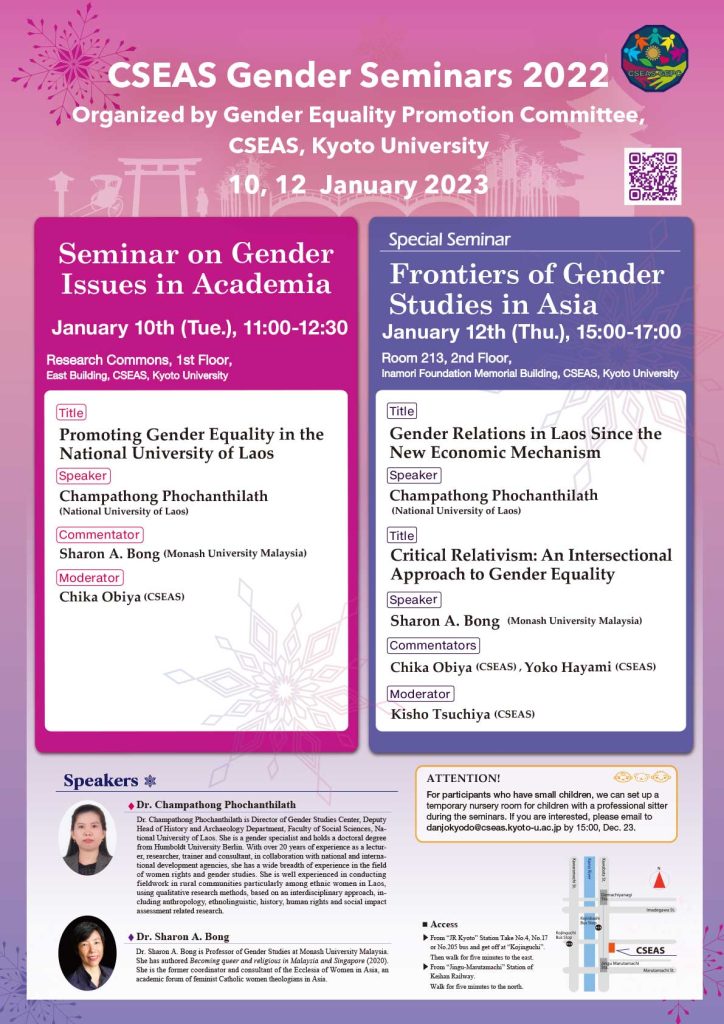Date & Time: January 12th (Thu.), 2023, 15:00-17:00
Venue: Seminar Room 213, 2nd Floor, Inamori Foundation Memorial Building, CSEAS
Speaker: Champathong Phochanthilath (National University of Laos)
Title: “Gender Relations in Laos Since the New Economic Mechanism”
Abstract:
This presentation studies the gender relations since the changes instituted under the New Economic Mechanism have been consequently changed by further national development policy reforms. Under the “Chintanakan Mai” slogan comprehensive transformation as a result of the new policy has occurred. Chintanakan Mai represents a new way of thinking; however, socialist ideology remains as the final goal with gender equality left behind. The reform of the economy creates a difference between urban and rural women and privatisation of state property clearly shows gender inequality in relation to land ownership rights. Economic transformation from centrally planned economy to the market-oriented economy, which is called New Economic Mechanism (NEM), has proved that gender equality was not achieved even when Pathed Lao was liberated. The perception of gender has been changed due to the labour force shifted from state female workers – ກຳມະກອນລັດ to ກຳມະກອນຮັບຈ້າງ – unskilled labours in private sectors. The perception – ສາວໂຮງງານຕັດຫຍິບ has devalued women from building the nation to being individual survivors. Gaining access to markets and financial services is difficult for many women due to poor infrastructure and a lack of guarantee, insufficient business history and especially the certificate of land title. On the other hand, the comprehensive reform creates opportunities for women of the lower class who have had a chance to benefit from the market economy and have been able to improve their social class status and move up into the middle class. Professional women who have received the benefit of a good education and who have had strong support from their family have been able to gain promotions. Some women have been successful in obtaining positions to serve as ministers and even in one case as the President of the National Assembly. However, women are still facing challenges such as being women in the rural area where the foreign investors are occupying while rural women are powerless and lack means for negotiation.
Speaker: Sharon A. Bong (Monash University Malaysia)
Title: “Critical Relativism: An Intersectional Approach to Gender Equality”
Abstract:
I draw from my own research and teaching expertise on the intersection of genders, sexualities and religions in Southeast Asia. I begin with ‘The framework’ where I draw on her-story of feminisms and situate intersectionality within knowing and doing feminisms. I move onto ‘The problem’ which begins with the construct of rights as universal and how that clashes with the particularities of cultural and religious underpinnings of sex/gender binaries. Finally, I close with ‘The solution’ – an intersectional approach to realising gender equality and equity. I term this as “critical relativism” as it bridges the tension between universalism and cultural relativism.
Commentators: Chika Obiya (CSEAS), Yoko Hayami (CSEAS)
Moderator: Kisho Tsuchiya (CSEAS)
About Speakers:
Dr. Champathong Phochanthilath is Director of Gender Studies Center, Deputy Head of History and Archaeology Department, Faculty of Social Sciences, National University of Laos. She is a gender specialist and holds a doctoral degree from Humboldt University Berlin. With over 20 years of experience as a lecturer, researcher, trainer and consultant, in collaboration with national and international development agencies, she has a wide breadth of experience in the field of women rights and gender studies. She is well experienced in conducting fieldwork in rural communities particularly among ethnic women in Laos, using qualitative research methods, based on an interdisciplinary approach, including anthropology, ethnolinguistic, history, human rights and social impact assessment related research.
Dr. Sharon A. Bong is Professor of Gender Studies at Monash University Malaysia. She has authored Becoming queer and religious in Malaysia and Singapore (2020). She is the former coordinator and consultant of the Ecclesia of Women in Asia, an academic forum of feminist Catholic women theologians in Asia.
ATTENTION!
For participants who have small children, we can set up a temporary nursery room for children with a professional sitter during the seminars. If you are interested, please email to danjokyodo[at]cseas.kyoto-u.ac.jp by 15:00, Dec. 23.
